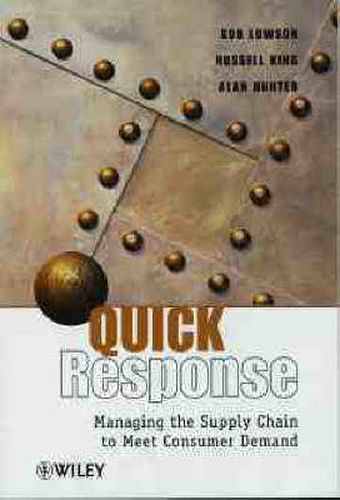Readings Newsletter
Become a Readings Member to make your shopping experience even easier.
Sign in or sign up for free!
You’re not far away from qualifying for FREE standard shipping within Australia
You’ve qualified for FREE standard shipping within Australia
The cart is loading…






The gap between demand for consumer goods and their efficient supply is greater now than at any other time, and is widening as consumersa wants become less predictable, and suppliers struggle to meet them. Quick Response (QR) is both a management paradigm and a methodology that allows supply systems to react quickly to changes while improving their performance. QR aims to help organize a business in the face of problems associated with the vast array of goods and services now to be found in consumer markets. It is particularly relevant to the Fast Moving Consumer Goods (FMCG) and Fashion industries. QR works by compressing the time between product or service design concept and appearance on the retail shelf. It then takes advantage of such recent technologies as Point of Sale (PoS) tracking and Electronic Data Interchange (EDI) to constantly up–date estimates of true consumer demand, and then places intelligent re–orders for goods with flexible manufacturers and their suppliers. One of the features of this book is the demonstration that the range of industries able to benefit from the application of QR methodologies is extremely wide. However, this apparent universality comes with a strong a health warninga . By placing QR in a broad framework of management thinking, the book allows comparison with other paradigms and their off–shoots – partnerships and alliances, measurement and benchmarking, Information Systems Technology strategies, Total Quality Management, and change management. Belief systems such as World Class Manufacturing, Lean Production, Agile Manufacturing, Virtual Organization, Time–Based Competition, Supply Chain Management (SCM) and chaos theory, are also reviewed and contrasted. The book then quantifies the performance benefits that accrue from the application of QR using examples from the US and European industries as well as computer simulation. Lessons are also drawn from a wide variety of SMEs (Small and Medium sized Enterprises) who are using QR as a strategic tool, as well as those who have not yet adopted it. For the latter, there are recommendations for implementing QR. The future management and research directions required for full exploitation of QR are also explored in a separate section. The most important aspect of this book is that it concentrates on the practical, hands–on management of a supply pipeline as opposed to the generalized theories of Supply Chain Management.
$9.00 standard shipping within Australia
FREE standard shipping within Australia for orders over $100.00
Express & International shipping calculated at checkout
The gap between demand for consumer goods and their efficient supply is greater now than at any other time, and is widening as consumersa wants become less predictable, and suppliers struggle to meet them. Quick Response (QR) is both a management paradigm and a methodology that allows supply systems to react quickly to changes while improving their performance. QR aims to help organize a business in the face of problems associated with the vast array of goods and services now to be found in consumer markets. It is particularly relevant to the Fast Moving Consumer Goods (FMCG) and Fashion industries. QR works by compressing the time between product or service design concept and appearance on the retail shelf. It then takes advantage of such recent technologies as Point of Sale (PoS) tracking and Electronic Data Interchange (EDI) to constantly up–date estimates of true consumer demand, and then places intelligent re–orders for goods with flexible manufacturers and their suppliers. One of the features of this book is the demonstration that the range of industries able to benefit from the application of QR methodologies is extremely wide. However, this apparent universality comes with a strong a health warninga . By placing QR in a broad framework of management thinking, the book allows comparison with other paradigms and their off–shoots – partnerships and alliances, measurement and benchmarking, Information Systems Technology strategies, Total Quality Management, and change management. Belief systems such as World Class Manufacturing, Lean Production, Agile Manufacturing, Virtual Organization, Time–Based Competition, Supply Chain Management (SCM) and chaos theory, are also reviewed and contrasted. The book then quantifies the performance benefits that accrue from the application of QR using examples from the US and European industries as well as computer simulation. Lessons are also drawn from a wide variety of SMEs (Small and Medium sized Enterprises) who are using QR as a strategic tool, as well as those who have not yet adopted it. For the latter, there are recommendations for implementing QR. The future management and research directions required for full exploitation of QR are also explored in a separate section. The most important aspect of this book is that it concentrates on the practical, hands–on management of a supply pipeline as opposed to the generalized theories of Supply Chain Management.